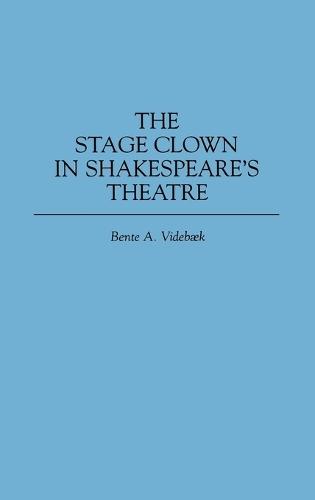Overview
The majority of Shakespeare's plays have at least one clown figure making an appearance. These characters range from rogues who say only a line or two, to important figures like Touchstone and Falstaff. Videbaek examines even the smallest clown roles, showing how the clown's freedom of speech allows him to become a mediator between the audience and the action of the play, helping audience interpretation. This illuminating celebration of the stage clown's contribution to the understanding and enjoyment of Shakespeare's plays will be a valuable resource for both students and scholars alike.
Full Product Details
Author: Bente Videbaek
Publisher: Bloomsbury Publishing Plc
Imprint: Praeger Publishers Inc
Volume: No. 69.
Dimensions:
Width: 15.20cm
, Height: 1.50cm
, Length: 22.90cm
Weight: 0.503kg
ISBN: 9780313298721
ISBN 10: 0313298726
Pages: 224
Publication Date: 18 April 1996
Recommended Age: From 7 to 17 years
Audience:
College/higher education
,
Professional and scholarly
,
Undergraduate
,
Postgraduate, Research & Scholarly
Format: Hardback
Publisher's Status: Active
Availability: Manufactured on demand 
We will order this item for you from a manufactured on demand supplier.
Table of Contents
"Introduction Minor Roles: Cameo Appearance, Great Effect Rustic Clowns in Titus Andronicus, The Taming of the Shrew, Antony and Cleopatra Servant Clowns in Romeo and Juliet, Othello, Macbeth, Timon of Athens, The Tempest Miscellaneous Clowns in Richard III, Hamlet, Pericles, Cymbeline, The Winter's Tale Major Roles: Expanded Function Bottom in A Midsummer Night's Dream, Dogberry in Much Ado About Nothing The Dromios in The Comedy of Errors, Speed and Launce in The Two Gentlemen of Verona Costard in Love's Labour's Lost, Launcelot Gobbo in The Merchant of Venice Pompey in Measure for Measure The Court Jesters in the Comedies Lavatch in All's Well That Ends Well Touchstone in As You Like It Feste in Twelfth Night The Clown as ""The Bitter Fool"" Thersites in Troilus and Cressida Lear's Fool in King Lear Falstaff as Clown The Henriad The Merry Wives of Windsor Clown Characteristics in Non-Clown Characters Philip the Bastard in King John Hamlet in Hamlet Conclusion Appendix: The Elizabethan Clown Bibliography Index"
Reviews
""Dr. Videbaek's book on the clown's role in Shakespeare is a highly original and illuminating account of the contributions to the plays of the resident comics in Shakespeare's company. The approach in this study is far from being narrowly literary or historical, but displays an excellent sense of theatre, and of the Elizabethan theatre in particular, treating Shakespeare's playwriting as a full performance art. The book is gratifyingly written, very much in the current mode of performance criticism.' I know of no study of the Elizabethan clown that senses so sensitively and richly his function in performance on the stage.""-J.L. Styan, Franklin Bliss Snyder Professor Emeritus of English Literature and Theatre, Northwestern University ?Her painstaking analysis of each clown's passage through it's play is commendable...the breadth and scope of her undertaking makes her book a valuable contribution to the field?-New England Theatre Journal ""Her painstaking analysis of each clown's passage through it's play is commendable...the breadth and scope of her undertaking makes her book a valuable contribution to the field""-New England Theatre Journal
Dr. Videbaek's book on the clown's role in Shakespeare is a highly original and illuminating account of the contributions to the plays of the resident comics in Shakespeare's company. The approach in this study is far from being narrowly literary or historical, but displays an excellent sense of theatre, and of the Elizabethan theatre in particular, treating Shakespeare's playwriting as a full performance art. The book is gratifyingly written, very much in the current mode of performance criticism.' I know of no study of the Elizabethan clown that senses so sensitively and richly his function in performance on the stage. -J.L. Styan, Franklin Bliss Snyder Professor Emeritus of English Literature and Theatre, Northwestern University
Author Information
BENTE A. VIDEBAEK is an Adjunct Professor of English at Suffolk County Community College. Born in Denmark, she holds degrees in English and Danish/Scandinavian from the University of Copenhagen. After moving to the United States, she obtained a doctoral degree in English literature from Northwestern University.
Tab Content 6
Author Website:
Customer Reviews
Recent Reviews
No review item found!
Add your own review!
Countries Available
All regions
|




